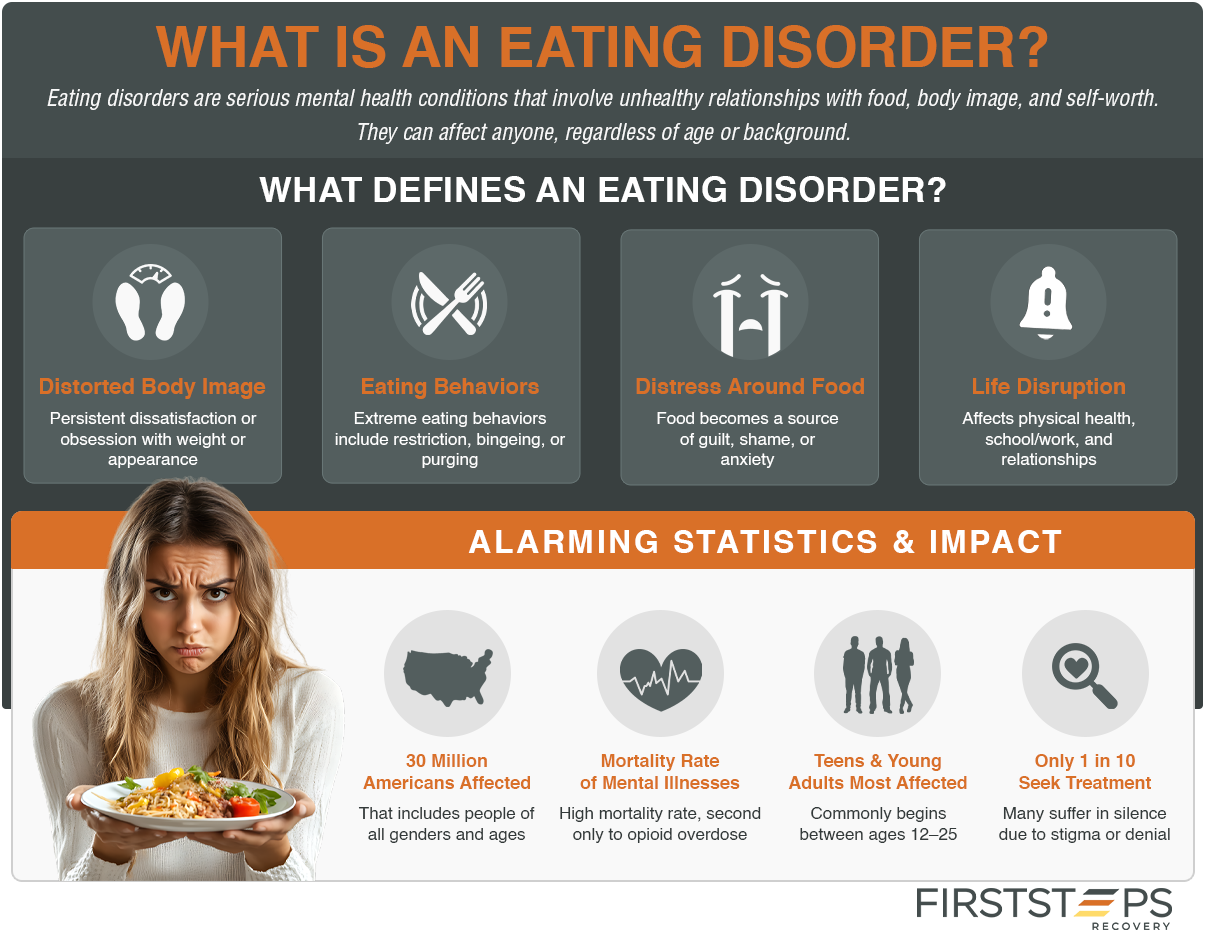
Eating disorders are complex conditions that affect a person’s relationship with food and their body. They are not just about food but often stem from a combination of biological, psychological, and sociocultural factors. These disorders can have serious health consequences and impact a person’s emotional and physical well-being.
Approximately 9% of Americans, or nearly 28.8 million people, may experience an eating disorder at some point in their lives. Eating disorders are a serious health concern, leading to about 10,200 fatalities annually—this means one person loses their life to an eating disorder every 52 minutes. Furthermore, the financial impact of these disorders on the economy reaches an estimated $64.7 billion each year.
There are a multitude of different eating disorders that clients in addiction recovery often report. Eating disorders have the potential to cause obsessive thoughts about the amount of food a person consumes, as well as other symptoms like depression and anxiety. People coping with eating disorders might use drugs or alcohol to suppress hunger or alleviate feelings of depression and anxiety. Initially, this might seem helpful, but eventually, substance misuse can aggravate eating disorder symptoms and pose serious health risks.
At First Steps Recovery, we understand the intricacies of eating disorders and the importance of personalized care. Our approach is comprehensive, addressing not only the symptoms but also the underlying causes. We offer support and treatment to help people regain control and embark on a journey to recovery. Our dedicated team is committed to providing the tools and resources necessary for each person to achieve long-term health and well-being, and for those who may also be facing addiction-related challenges, our outpatient program for substance abuse provides flexible, structured care that supports recovery alongside everyday responsibilities.
Eating disorders are serious health conditions that can profoundly affect a person’s mental and physical health. Here are the types of eating disorders and their impact on the brain:
Eating disorders can alter brain structure and function. They can lead to changes in neurotransmitter activity, which affects mood and stress response. The brain may also suffer from nutritional deficiencies, leading to cognitive impairments and difficulty in decision-making. Recovery from an eating disorder involves not only restoring physical health but also addressing the psychological aspects to promote a healthy relationship with food and self-image.

Recognizing the signs and symptoms of eating disorders is crucial for early intervention and support. These disorders manifest through a variety of emotional, behavioral, and physical signs that can significantly impact a person’s life.
These symptoms can vary widely among people and do not always fit neatly into categories. It’s important to approach someone you suspect may be struggling with compassion and to encourage them to seek professional help. Early recognition and action can significantly improve the chances of recovery.
The link between eating disorders and substance abuse is complex and multifaceted, with both conditions often coexisting and influencing each other. People with eating disorders may turn to substances as a way to cope with the emotional distress and psychological turmoil associated with their disordered eating behaviors. Similarly, people struggling with substance abuse may develop unhealthy attitudes and behaviors toward food, leading to the development of an eating disorder.
Eating disorders and substance abuse share common risk factors, including genetic predispositions, environmental triggers, and psychological stressors. The connection between eating disorders and substance abuse goes beyond just shared risk factors; there are also underlying psychological and neurobiological mechanisms at play. Both conditions involve dysregulation of brain pathways related to reward, motivation, and impulse control, leading to compulsive behaviors and difficulties in regulating emotions.
Furthermore, societal pressures and cultural norms around body image and substance use can exacerbate the co-occurrence of these disorders. Media portrayals of unrealistic beauty standards and glamorization of substance use can contribute to feelings of inadequacy and drive individuals towards unhealthy coping mechanisms.
Up to 37% of people with eating disorders also abuse drugs and alcohol, a rate significantly higher than the 10% prevalence of substance use disorders (SUDs) in the general population. This overlap suggests that the compulsive behaviors driving eating disorders may similarly influence substance abuse patterns.
Research indicates that up to 50% of people with eating disorders use alcohol or illicit drugs, a rate five times higher than the general population. Conversely, up to 35% of people dependent on alcohol or other drugs also have eating disorders, a rate eleven times greater than the general population. These figures underscore the urgency of addressing both conditions simultaneously.
The coexistence of eating disorders and substance abuse can lead to a heightened risk of premature death and long-term health complications. However, with integrated treatment approaches that address both eating disorders and substance abuse, people can embark on a path to recovery. It’s crucial for those affected to seek help from professionals who understand the complexities of these intertwined conditions.

At First Steps Recovery, we offer specialized treatment for dual diagnosis, and residential treatment center california addressing both eating disorders and substance abuse simultaneously. We understand the significance of comprehensive care in helping people achieve lasting recovery and lead fulfilling lives.
Proper treatment is essential for people struggling with eating disorders and addiction to attain long-term health and wellness. Throughout our treatment programs, clients learn invaluable coping skills, relapse prevention techniques, and effective craving control strategies to manage their addiction. Moreover, our dual-diagnosis approach ensures that clients receive targeted support for their eating disorders, empowering them to overcome obsessive thoughts about food and any other symptoms they may experience.
By addressing both eating disorders and addiction concurrently, our clients receive comprehensive care that targets the root causes of their struggles. With our compassionate team of professionals guiding them every step of the way, individuals can embark on a journey of healing and transformation.
At First Steps Recovery, we’re committed to providing the support and resources necessary for our clients to reclaim their lives and thrive. Take the first step towards lasting wellness and reclaim your life today. Contact us to learn more about our specialized treatment programs and start your journey toward healing.

From our certified therapists and nurses to our emotional support animal "Cooper", our entire team is dedicated to the health and success of our clients throughout our program and beyond.
Have questions about how our treatment programs works? Let's talk.
ADHD, or ADD, is a common neurodevelopmental disorder with attention and impulse control difficulties that can lead to substance abuse. Treatment with therapy and medication is crucial.
Anxiety disorder is a mental health condition characterized by excessive and persistent feelings of fear, worry, and apprehension that can significantly impact a person's daily life.
Bipolar disorder is a mental health condition characterized by extreme mood swings, including episodes of mania (elevated mood and energy) and depression (low mood and loss of interest).
Depression is a mental health disorder characterized by persistent sadness, loss of interest, and other emotional and physical symptoms
An eating disorder is a mental health condition characterized by abnormal eating habits. Getting help is important to address physical and psychological health risks, improve quality of life, and promote recovery.
Personality disorder is a mental health condition characterized by unhealthy patterns of thinking, behaving, and relating to others. Getting help is crucial to improve relationships, coping skills, and overall well-being.
PTSD (Post-Traumatic Stress Disorder)/Trauma disorder is a mental healtah condition resulting from experiencing or witnessing traumatic events. Getting help is important to process trauma, reduce symptoms, and improve overall quality of life.
Schizophrenia is a mental health disorder characterized by hallucinations, delusions, and disorganized thinking. Getting help is vital to manage symptoms, improve functioning, and enhance overall quality of life.
Have questions about our substance abuse treatment programs? Let’s talk.
Dayatra L.
Melissa B.
Bruce G.
Have questions about how our alumni program works? Let's talk.









Individual therapy can be beneficial for a wide range of mental health concerns including anxiety, depression, trauma-related disorders, relationship issues, and more. It provides individuals with a supportive environment to work through their challenges at their own pace and make meaningful progress toward their goals.

Have questions about First Steps Recovery? We're here to help.
© Copyright 2023 • First Steps Recovery • All Rights Reserved